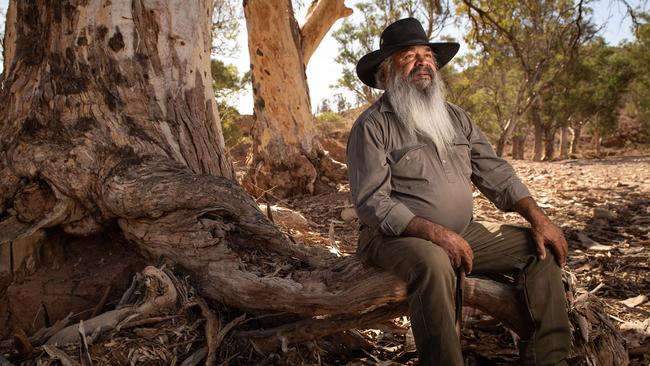Native title group wins court case to see where uranium royalties from Heathgate mine in SA have gone
The fate of millions of dollars worth of uranium royalties should soon be known, after a court ruling that the Adnyamthanha group get access to key financial documents.

Business
Don't miss out on the headlines from Business. Followed categories will be added to My News.
Members of the Adnyamthanha native title group in South Australia should soon have clarity around how tens of millions of dollars in uranium royalties have been spent following a ruling of the full Supreme Court.
Some members of the Adnyamathanha Traditional Lands Association (ATLA) have been battling for several years to get access to the financial records of a “master trust” which has been used to distribute mining royalties from the Heathgate uranium mine in the Northern Flinders Ranges to members of the group.
While the royalties, paid by Heathgate Resources and related company Quasar Resources, are worth millions of dollars per year - averaging an estimated $5m per year over the past four years, members of ATLA say - there has been no visibility as to how much money is flowing in, and how it is distributed.
More than $20m is now sitting in trust with South Australia’s Supreme Court, as ATLA battles with a company called Rangelea Holdings, run by ATLA’s former chief executive Vince Coulthard, for access to its books.
Rangelea was being used as the vehicle to distribute royalty funds to ATLA members, via the Adnyamathanha Master Trust, however some members, including Reginald Wilson, Sarah Taylor and Ivan McKenzie who brought the Supreme Court matter on, say they have never seen a reconciliation of how the funds were distributed, or even how much money was coming in.
The trio in the past made requests to Rangelea to inspect its financial records, however the requests were denied on the basis that ATLA was neither a member of Rangelea nor a beneficiary of the Trust and that “neither ATLA nor a special administrator has any power to seek access to the documents of the Master Trust’’, court documents state.
While associations such as ATLA are overseen by the Office of the Registrar of Indigenous Corporations (ORIC), Mr Coulthard has argued in the past that “Rangelea is a company registered by ASIC, not by ORIC’’, and therefore the regulator had no right to access its books.
ATLA was placed under “special administration” by the Registrar of Indigenous Corporations in March 2020 in a bid to address what it deemed “chronic and severe’’ problems around record keeping issues relating to meetings, memberships, directorships and spending.
The association remains under administration, under the control of special administrator Peter McQuoid, who told The Australian this week that its members had been “shocked” at the amounts which had been flowing into the Supreme Court trust account, which they previously had not been privy to.
“It’s the first time they’ve had any idea at all how much money has been flowing,’’ Mr McQuoid said, telling the Australian the trust account had accrued more than $20m over the past three to four years.
South Australia’s chief justice Chris Kourakis ruled in April 2023 that the three members who brought the case against Rangelea should be given access to the financial documents of the master trust, and that an inspector be appointed to investigate how the trust had been managed by Rangelea.
The inspector was to be directed to produce an interim report within 30 days of that judgment, with a view to producing a final report at a later date.
The books, covering the years from 2018-2022, were never handed over, following an appeal to that decision being lodged, sending the matter to the Full Court of the Supreme Court.
The Full Court on Friday dismissed Rangelea’s appeal, meaning that process will resume, with the financial records expected to be handed over imminently.
The 2023 court judgment documented the practice used to distribute the royalties, with the money divided up among eight subgroups, with the funds being paid to the head or heads of each subgroup, who would then further distribute the funds among their members.
The judgment said the three applicants told the court they had concerns the money was not being distributed fairly, and hence they wanted access to the records.
Mr Wilton told the court at the time he had been paid amounts ranging from $90-$550 about every six months, “but that he was never provided with information about when payments could be expected or about the meetings of Rangelea’’.
“Mr Wilton deposed that he thought he ‘was not getting paid right and that the payments were not fair’,’’ the judgment says.
“He understood that some Traditional Owners did not receive payments.
“Mr Wilton’s objective is to see ‘fairness and for the money to be distributed out properly and open the books for us beneficiaries’.’’
Mr Wilton told the court, “we never had any idea how much money the master trust was receiving or what Rangelea was doing with the money”.
Mr McKenzie, who is Mr Coulthard’s brother-in-law, told the court during the previous hearings “that there were discrepancies in the payments of royalties between Traditional Owners’’ and that he “had historically received payments which he described as ‘good amounts compared to others’.’’
While making no comment as to how competently the funds have been managed, the 2023 judgment said there was “strong reason to exercise such discretions as there may be in favour of making the trust accounts of the master trust available to the Adnyamathanha applicants and ATLA and for the appointment of an inspector’’.
An argument put forward in defence of not releasing the records was that the trust was a charitable trust not a private trust and therefore had no beneficiaries.
The Chief Justice ruled in 2023 that this was incorrect, and given that the applicants were beneficiaries of the trust they were entitled to have access to its records.
“Millions of dollars are paid annually to Rangelea by Heathgate and Quasar,’’ the judgment says.
“The native title rights from which that income is derived is the property of all Adnyamathanha common law holders.
“It is natural that persons in the position of the Adnyamathanha applicants would want to be properly informed.’’
Mr Coulthard said in 2023, when the appeal was lodged, that outsiders should stay out of the association’s business.
“I don’t know why people are so interested in how traditional owners spend their money,’’ he said.
“ORIC is trying to dictate. They’re trying to become the protectors of aborigines. Those days are gone. We’ve been down that road.’’
Rangelea could still appeal Friday’s decision to the High Court. Mr Coulthard was contacted for comment.
Originally published as Native title group wins court case to see where uranium royalties from Heathgate mine in SA have gone



